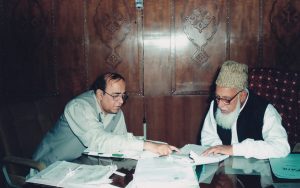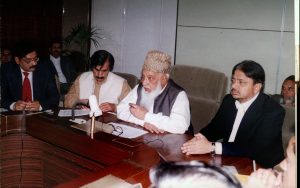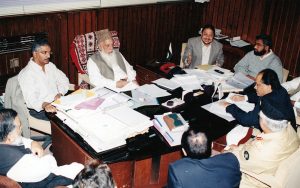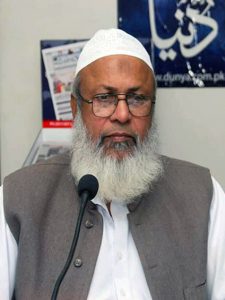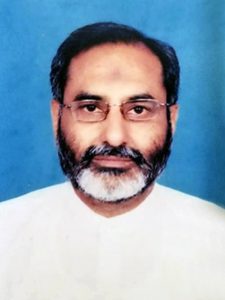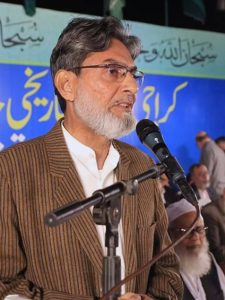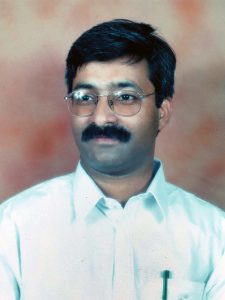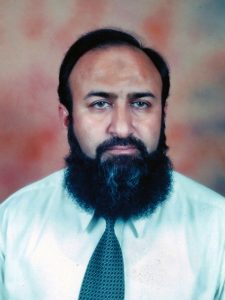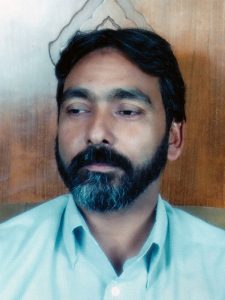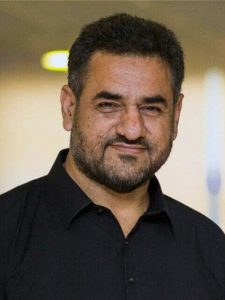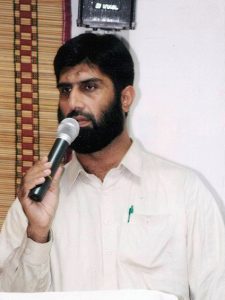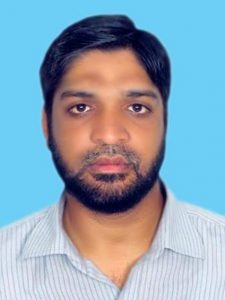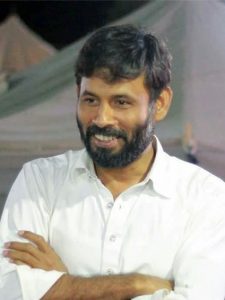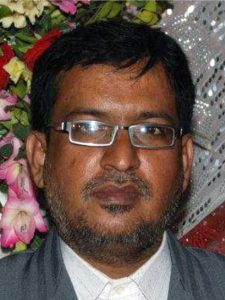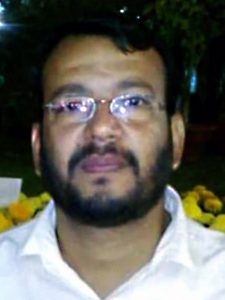TO SERVE, NOT TO RULE!
The next was the oath-taking, which was scheduled to take place at the Baradari. Prior to the ceremony, former Karachi commissioner and the first district coordination officer Shafiq-ur-Rehman Paracha visited my house. His visit came as a surprise because I couldn’t comprehend the reasons. He sat in my drawing room. After the usual formalities, Shafiq-ur-Rehman Paracha said, “I will be fully cooperative to you. But despite my efforts, if you ever have a concern, feel free to let me know directly.” Besides this, a lot of other things were discussed and I continued to listen without interrupting him. I finally asked: “What do you expect of me” and spontaneously, he said, “your kindness!” He added, “Be at ease; we will utilize your experience gained over the years to build and develop Karachi, and we will be working as a team.”
The oath-taking was set for August 11, 2001; it was cloudy since morning that day. The event was attended by some of my family members, high-ups of Jamaat-e-Islami, some of the elected representatives, as well as respected Mufti Rafi Usmani, Qari Raza al-Mustafa Qadri, Dr. Abdul Razzaq Sikander, Allama Hassan Turabi and Mufti Nizamuddin Shamzai. After the recitation of the Qur’an and Naat-e-Rasool (ﷺ), district returning officer Agha Muhammad Rafiq administered oath to naib nazim Tariq Hassan, followed by my oath. Afterwards, the secretary at the stage invited me to address the gathering as the city nazim. I was fearful, because I thought that I have been blessed by Allah, but being the mayor might turn out to be a test for me. So, when I reached the podium, I started to recite a prayer. Addressing the participants, I said: “I’m grateful to Allah to have been elected mayor of a city where the inhabitants have so much love for me. In return for the love from my brothers, sisters and the youth of the city, all I can do is to pledge to do everything possible to be of service to them.”
I added: “With Allah and all of you as my witnesses, I pray to Allah to honor this oath. I ask you all to be with me in this prayer to grant me the power to stand by my words, spoken for the people of Karachi.” I also said: “Allah, I have decided to work only to please you. You have given me everything in this world and you blessed me with a post that I do not consider myself worthy of. O’ Allah, this is your blessing, it is only you who has the reins of this world and with your sagacity and your will, you chose an individual like me who is in dire need of strength and wisdom to fulfil this role.”
We all owe to Karachi, the largest city of the country, the mini-Pakistan. It gave us our current status. We are, what we are, because of Pakistan. If there was no Pakistan, we wouldn’t be, what we are today. Addressing the participants, I said: “I am completely aware of the city’s issues. I have been living in Pakistan, in Karachi for the past 53 years. This is my city, it’s my life, my heart, and its people; the elderly and my sisters and daughters are very close to my heart.” “I have taken up this post for the people of the city. I want to serve as a bridge between those who migrated from India and the ones who came from every province. I intend to ease their pain and utilize the efforts of the nazim, naib nazim, elected representatives and cooperation and prayers of the masses to resolve their issues in the shortest possible time.”
The fact is the whole speech was a long prayer, amidst tears. I saw Mufti Rafi Usmani in tears. Later on, when I met him after a long time, he told me he prays for me after every obligatory Fajr prayer. The next morning, around 8am, I left with my driver for the KMC. The nazim secretariat used to be in that building at the time. I had traveled some distance when I noticed a Hyderi police station mobile moving along. I asked my driver to stop the car and ask for someone in the mobile to come talk to us. An official came and asked earnestly: “Yes sir! What are your orders?” I told him I didn’t need protocol and they should return. He replied: “Sir, we are obliged to follow orders; we don’t act on our own. If you think it is suitable, you may talk to our officer instead.” I asked him to talk to his officer himself and let him know that we do not need any security. The mobile was now following us from quite far.
The officer had been informed of my arrival before I got there and the DCO was already there. I went through the files of different departments, a lot of which were of the infrastructure and education departments. I had taken the charge but the powers were not clear, and the SLGO wasn’t able to explain them. So, the day’s initial phase of the mayoral tasks went by in a state of confusion. Zubair Mansoori and the city councilor came to me and asked how I got there. I replied that I had reached like I used to, when I went to JI’s office and asked if it should’ve been any different? They said: “Naimat sahib, you know the situation…but [you took] no security measures.” I was looking at the files again. Meanwhile, a man representing a five-star hotel visited the secretariat and happened to meet Zubair Mansoori. He asked: “What will sahib like in the menu today?” When told that the mayor will be eating homemade food, he replied that the previous administratorused to have lunch from his hotel. It was revealed later on that the cost for one meal amounted to several thousands. Several well-wishers dedicated their time for the mayor’s office despite their busy schedule. The JI Karachi nazm constituted committees for different departments and assigned honorary tasks to some of the party’s associates in my team. The committees were led by Birjees Ahmad sahib. Birjees sahib earlier served as the municipality’s councilor and had been a part of Karachi JI’s nazm for a considerable time. Those who extended their help included both the elected and unelected. Some of them were Abdul Rasheed Baig, Muslim Pervez, Engineers Saleem Azhar and Izhar-ul-Haq, Nasrullah Shaji, Zahid Saeed, Abid Ilyas, Qazi Saddruddin, Ansar Razi, Tauseef Ahmad, Nasim Siddiqui, Muhammad Tufail, Zubair Mansoori, Gohar-ul-Islam, Saifuddin Advocate, Dr. Faiyaz Alam, Rashid Qureshi and Hanif Akbar. On one hand were the massive issues facing the city, while on the other, officers of different departments of the former commissioner-based system were reluctant to act as per orders under the new system.
The SLGO would undergo amends every few days in view of the frequent issues. The tenure of the city government under the SLGO was initially three years, which was later extended to four years. It didn’t have any mention of the KBCA and KWSB. When a six-month term was decided as per the National Reconstruction Bureau, powers were still to be devolved from the deputy commissioner to the grassroots. Some of the officers were unhappy with this and weren’t cooperative. It was then decided to phase-out the issues and their proposed solutions. Union Council nazims would start resolving the immediate and small-scale issues, such as sewerage and repair of smaller roads. Rs3.4 million were allocated for every Union Council in the first year’s budget for the purpose. Some of the bigger projects came under the jurisdiction of towns. In fact, they were responsible for them.
The city government decided in principle to renew the mega projects and the overall infrastructure. I had pledged from day one to serve the city sans discrimination and – with the grace of Allah – there was no concern raised from any town or UC of preferential approach from any town or UC. An interesting incident also occurred in the beginning. I was in my office looking at some files when a security guard rushed into my room. He was visibly worried and could hardly say: “A lot of people have stormed the office despite my efforts to stop them. They want to meet you.”
Protest For Water
I got up and asked him to let them in. He was still reluctant so I repeated what I had said. Meanwhile, chants of “pani dou…pani dou!” became clearer. When I came out, I saw a large number of men and women of dark complexion and curly hair gathered. It was clear that they were from Lyari. I let them inside my office. There were not enough chairs so I asked the rest to sit wherever they could. When I asked them what the issue was, a commotion erupted again. All I could understand was “pani”. When they finally stopped talking, I said: “I have taken charge only a week ago; your concerns are legit. I promise you a visit in a day or two and take immediate measures after reviewing the situation.” I had barely completed my sentence when a healthy youth rose and quietly harshly said: “Everyone says that. Earlier, others made the same promises but no one came [to the area].”I asked them to wait for just a day or two.
A large mass converged when I reached the area after two days with Lyari’s town nazim Abdul Khaliq Jumma and a few others. I traveled deep in the area and spoke to residents. I found out that the adjoining areas has water, but several areas of Lyari do not have access to it for weeks. I issued directions on the spot to provide water temporarily, and submit a plan for a consistent provision. While I had just taken charge, more issues surfaced. It couldn’t be determined as to who would issue domiciles, and birth and death certificates. The SLGO kept silent about this. Also, institutions like KDA and KMC had merged into the city government, but the issue of KBCA and water board was still complex. These two were supposed to be merged in the government, but the provincial government didn’t hand them over to the authority.
KBCA Issues
Brig (retd) SA Nasir was heading KBCA at the time and had the backing of some high-ups of the provincial government. He did not want to work under the city government at any cost. I also wrote to him but without a response. The KBCA became an institution parallel to the city government. I then sent out letters to TMOs of all towns, conveying that the issues related to towns will be looked after at the same level. I mentioned that the SLGO specifies the same. I also issued a notification, directing the relevant KBCA officials to fulfil their duties in the towns, starting the next day. This created a ruckus. Chief Secretary Saleem Khan reached out to me and said that an emergent meeting is being called to review the issue. After the meeting, he said that the city government’s notification has complicated things and has brought even the ongoing activities to a stop.
Then he specifically asked me to withdraw the notification for now. The same was the case at the water board, previously headed by Brig (retd) Behram Khan. He was an officer of good repute and took interest in resolving the issues regarding water provision. He was transferred shortly after I took charge. Then it became a trend as Brigadiers (retd) Javed Ashraf, Asif Ghazali and Iftikhar Haider came and left one after the other, and none of them was satisfied taking orders from the city government. Sometime after I took office, Col (retd) Tahir Mashhadi challenged the election of the city’s mayor. Interestingly, he was one of the mayoral candidates and was later elected a senator on MQM’s ticket. The case was being heard at session court, and our counsel Manzoor Satti would attend the proceedings. As the saga went on, I continued to fulfil my routine official duties carefree.
One day, naib nazim Tariq Hassan came all worried. I asked him: “What happened? Is everything okay?” I knew that he had been in the court for the hearing. He said: “Naimat sahib, I have met the lawyer and he says that the judge seemed to have a different tone today and he would announce a verdict against us tomorrow.” Then he added, “If this happens, our current posts…” Interrupting him, I said: “Let it go Tariq. In fact, we will then be free of our responsibilities.” He said: “I’m so worried and you seem to be making a humorous comment.” I replied: “Jamaat-e-Islami has taught me two things; do not wish for a post and if you still get one, think of it as Amanat and a test from Allah. The second thing that I’ve learned is having faith in Allah.” I’m not aware of how much he understood what I said, but he sure did seem at ease. A few days later, the court ruled in our favor a few days later. Manzoor sahib, our counsel, remarked that the verdict was actually meant for the people of Karachi.
There was only one way of running the city in a better way; by keeping in touch with the 178 UC nazims and 18 town nazims, and resolve the issues – pertaining to the city government – on merit. We decided that there won’t be no discrimination based on one’s affiliation with a group or party. Maintaining this balance wasn’t easy. Every area of the metropolis had complex issues that had been pending for years. We didn’t have a magic wand to resolve all issues at once, but city council’s Tariq Hassan, naib nazim, and Muslim Pervez were meticulous and they took everyone on board. The role played by Abdul Rasheed Baig, Qazi Sadruddin, Abid Ilyas, Engineer Abdul Aziz, Rehana Afroze, Gohar-ul-Islam, Sajjad Dara, Hakim Mujahid Mehmood Barkati, Zahid Saeed, Hakim Saadat Ibrahim, PPP’s Najmi Alam and Saeed Ghani and senior council member Siddiq Rathore was admirable.
They prioritized the city’s interests and resolved the matters involving disputes with unanimity. The budget sessions did involve some heated conversations but the budgets would eventually be approved by all. I and the DCO continuously consulted town nazims and we ensured the participation of EDOs of key departments in those meetings. All town nazims were actively involved for the progress of the city. My doors were always remain open for them. It is for these reasons that we were able to work as a team and a family. Elected representatives from the minorities and women councilors also worked tirelessly.
Several people had been elected for a public office for the first time and were unaware of the rules and regulations, but they had the will to learn about how it is run. This is why the city government later proved to be an example for the rest of the country.
Khushhal Pakistan Program
Prior to the inaugural city government, the federal government had initiated a major and multi-faceted development project, titled ‘Khushhal Pakistan’. Under the four phases of this program, we completed several billion-rupee projects across the metropolis by late 2004. In addition to various streets, it included improvement and signalization of Gurumandir, Numaish, Five Star Chowrangi, Aisha Manzil Chowrangi, Banaras Chowk, Nagan Chowrangi. A lot of work was also done to uplift the sewerage system. A large part of the system in Gulshan Town and Jamshed Town was separated from the storm-water drain and a new sewerage system was laid. Moreover, worn out sewerage lines were replaced across Karachi as part of a large-scale project. I tasked engineer Saleem Azhar with the monitoring of Kushhal Pakistan program and asked him to execute the projects in coordination with the town and UC nazims.
All towns were provided machines – such as the tractor trolley – worth Rs6.5 million to pick up waste and upgrade the system of cleanliness. The 178 UCs of the city were also given trollies and other machinery. In addition to the elected representatives, two officers namely Nisar Sario and Muhammad Shakeeb put in extraordinary effort and zeal and fulfilled their official responsibilities with full commitment towards making the large-scale development a success.
The collective efforts from elected representatives and officials for development projects ensures success. With the grace of God, we had the cooperation of bureaucracy and officers of different departments and we served the city as a team.
Shah Faisal Colony Flyover
The first flyover that the city government initiated during its term was in Shah Faisal Colony. It had been tendered to a contractor sometime before the advent of the city government. The foundation stone of the Rs270m-project was laid by then president Pervez Musharraf on August 15, 2001. It was our first development project so if we delivered quality, in a transparent way, it would pave the way for future projects, and help develop an understanding with the contractor and the officers. I discussed this with engineer Saleem Azhar and the officers of the Works & Services Department. I also convened the representative of the company assigned the project and assured him timely payments, without any bribe involved. I said that our team members need to be satisfied, and our engineers will be taking the measurements before the payment is made. He responded that his company will come up to our expectations, God willing. He also expressed the desire to serve the city and deliver quality work but also pointed at the ‘high’ rate of bribe. I was impressed by his straight talk.
There were several houses in the way of the flyover. We paid the residents as per the market rate so they could arrange for an alternative residence. I gave the cheques to all of them myself. Surprisingly, the project took Rs190 million to complete, excluding the money given to the residents. It was perhaps the first time that a project was completed for a lesser cost than its tendered amount. The tradition has been to deliberately employ delaying tactics, with the cost skyrocketing. The saving of several crores raised the team’s spirits and set the precedence for future projects. The people of Shah Faisal Colony took a sigh of relief, because they no longer had to wait at the railway crossing. Being the main railway line, the crossing would shut several times during the night and day, causing frequent traffic jams. We had decided from day one that irrespective of the type and place, we would review and scrutinize every aspect of a project, including its tenders and past agreements, so we’re not oblivious to anything.
The city government wasn’t doing well financially and an immediate rise in the earning was necessary. An easy way out was to put more taxes on the people who already had to deal with several taxes. The idea proposed by some of the officers to introduce new taxes didn’t get our nod. As part of the alternatives, in the first phase, the city government decided to transparently auction commercial projects. Two to three of those were crucial, such as the parking contract of Hawkes Bay truck stand was with one party for years, and they would annually submit Rs4.5m in return. Subsequently, an auction committee was formed led by Muslim Pervez, and it announced the auction after a full review. A lot of people participated in the activity and placed their bids. The previous Rs4.5 million contract finally settled for Rs17.5 million, meaning a threefold increase. When the successful bidders reached the site, they were threatened by the previous contractors and sent back. When somewhat coerced, they went to JI Karachi office and told city’s ameer Dr. Meraj-ul-Huda Siddiqui and claimed supporting JI’s in the past, adding: “but your city nazim wants to destroy us financially.” Dr. Meraj refused to request for any undue favor on their behalf. DIG Karachi Tariq Jameel was then asked to resolve the issue and a large contingent of police was able to end the forced control. The next year, the contract went out for Rs14 million, whereas the stand had been recording Rs17.5 million annually before the end of the city government’s term.
The government also held talks regarding the auction of commercial property, in order to boost earnings. The selling of Americano Drycleaners land remained popular and made headlines for days. The business was set up on city government’s land and its owners had been paying few hundred rupees for the past 40 years, which was negligible compared to the property. When the lease neared its end, one of the owners came to me and requested its renewal. I said that instead of extending the lease, I will have it auctioned and invited him to participate in it. “If you succeed in the bidding, you may have it as usual.” He objected to the move, saying no previous government had done it. The advertisement generated responses from many bidders. The site was sold for Rs67.5 million and the new owners were given the control forthwith.
Interestingly, this didn’t go down well with the elements that claimed to be loyal to city’s interests and they challenged the decision in the court on the grounds that the city nazim cannot auction the site. A few days later – Syed Sardar Ahmad – a senior provincial minister belonging to Muttahida and I were the participants of a seminar. While speaking about the financial constraints, I made a reference to the said auction. On his turn, Sardar Ahmad sahib said: “No one can ever question Naimat sahib’s honesty and credibility. I am fully aware of the matter and I can say with conviction that his decision to auction the site was absolutely right and in favor of the metropolis.” In order to keep every process of such auctions transparent and free of doubts, I took public representatives onboard, besides officials. I also constituted a consultative committee to ensure further transparency. In the following phase, I collaborated with Transparency International to develop a procurement manual in an effort to eradicate corruption.
![]()
